Catégories
|
Thésaurus IAMM > ECONOMIE > ECONOMIE AGRICOLE > SYSTEME DE PRODUCTION > AGRICULTURE BIOLOGIQUE
AGRICULTURE BIOLOGIQUEVoir aussi |
Documents disponibles dans cette catégorie (562)
 Ajouter le résultat dans votre panier Affiner la recherche
Ajouter le résultat dans votre panier Affiner la recherche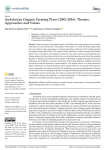
Article
Organic farming in the Spanish region of Andalusia has acquired great socio-economic importance over the past decades. The purpose of this article is to study the themes, approaches, and socio-political values pertaining to ecological agricultur[...]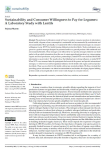
Article
We performed a laboratory study in France to explore consumer reactions to information about lentils, a legume whose consumption is sustainable and recommended by nutritionists and environmentalists. More specifically, we examined the effect of [...]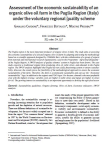
Article
Puglia region is the most important producer of organic olives in Italy. The study aims at assessing the economic sustainability of a selected organic olive oil farm by adopting and testing the methodology based on a scientific approach designed[...]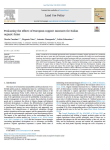
Article
Today, a model for an eco-friendly agricultural sector represents a necessity. Organic agriculture is a production system that tries to reach this goal. European programs encourage farmers into being more environmentally conscious: the funds for[...]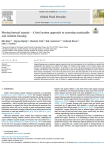
Article
E. Röös ; B. Bajzelj ; C. Weil ; E. Andersson ; D. Bossio ; L.J. Gordon |Organic farming aims to minimize negative impacts on the local environment, but its contributions to global food sustainability also depend on a resilient food supply. We studied a farm aiming to move beyond organic and become “a sustainable far[...]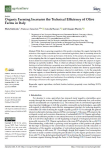
Article
M. Raimondo ; F. Caracciolo ; C. Nazzaro ; G. Marotta |While there is growing recognition of the positive role played by organic farming in the reduction of the negative externalities due to conventional agriculture, there is uncertainty about the effect of the latter on the economic performance of [...]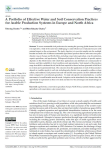
Article
To secure sustainable food production for meeting the growing global demand for food, it is imperative, while at the same time challenging, to make efficient use of natural resources with minimal impact on the environment. The study objective is[...]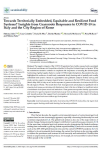
Article
S. Zollet ; L. Colombo ; P. De Meo ; D. Marino ; S.R. McGreevy ; N. McKeon ; S. Tarra |The negative impacts of the COVID-19 pandemic have further exposed and exacerbated the structural weaknesses and inequalities embedded in the global industrial agri-food system. While the mainstream narrative continues to emphasise the importanc[...]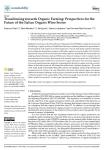
Article
F. Varia ; D. Macaluso ; I. Agosta ; F. Spatafora ; G.D. Guccione |In recent years, after the publication of Regulation (EU) 2018/848 on organic production and the labelling of organic products, all stakeholders have been considering threats and opportunities in the development of the organic food and beverage [...]
Article
The communal pastures of the Natural Park Sierra de Grazalema are grazed by a total of 23 extensive herds, of which 75% are certified as organic, although only 39% are subsidized for being organic. In a previous research work, these farms were c[...]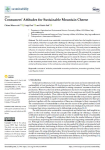
Article
The shift towards more sustainable consumptions and habits have had tangible impacts on food markets, which have accepted this challenge by offering a variety of certification systems to pull consumers aside. However, food purchasing choices are[...]
Article
G.D. Guccione ; E. Pagliarino ; I. Borri ; A. Vaccaro ; P. Borsotto |Italy is the leading European rice producer. The transition to organic farming of rice farms could represent a solution for environmental protection, as well as for their economic sustainability, consumer safety, and as a measure of climate miti[...]
Article
Within the new "European Green Deal", the European Commission defined crucial challenges for the agriculture of future decades, such as making food production more sustainable by considering the local pedo-climatic and socio-economic specificiti[...]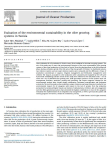
Article
Olive cultivation for oil production in Tunisia covers from traditional to innovate cropping systems. The aim of the study was to assess the environmental footprint of the most representative olive growing systems of the actual production of oli[...]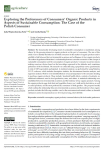
Article
The dynamically developing trend of sustainable consumption is manifested, among others, by the growing interest in organic products on the part of consumers. The aim of this article was to identify the behavior of Polish consumers in the market[...]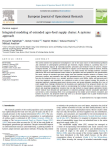
Article
F. Taghikhah ; A. Voinov ; N. Shukla ; T. Filatova ; M. Anufriev |The current intense food production-consumption is one of the main sources of environmental pollution and contributes to anthropogenic greenhouse gas emissions. Organic farming is a potential way to reduce environmental impacts by excluding synt[...]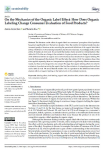
Article
The literature on the effect of organic labels on consumers’ perception of food products has grown significantly over the last two decades. Since the number of empirical studies has also increased greatly, a literature review revealing the opera[...]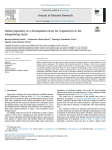
Article
Spain is a global leader in the wine sector in terms of production capacity, which is in stark contrast to its low domestic wine consumption. This situation forces Spanish producers to develop a clear focus on exports. Traditionally, the busines[...]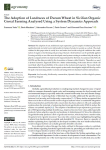
Article
F. Varia ; D. Macaluso ; A. Vaccaro ; P. Caruso ; G.D. Guccione |The adoption of rare, traditional crops represents a good example of enhancing functional agrobiodiversity, not only to provide benefits for farmers but also for society as a whole. The study outlined in this paper aims to verify how and under l[...]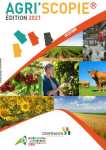
Série
Chambre régionale d'agriculture d'Occitanie ; Cerfrance | Castanet Tolosan : Chambre régionale d'agriculture d'Occitanie | Agri'scopie | 2021Pour la 6e année consécutive, Agri’scopie® Occitanie vous expose les principaux chiffres de l’agriculture régionale et vous permet de mieux comprendre et appréhender les problématiques de notre agriculture régionale. Agri’scopie® se positionne[...]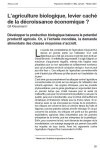
Article
Développer la production biologique baissera le potentiel productif agricole. Or, à l’échelle mondiale, la demande alimentaire des classes moyennes s’accroît.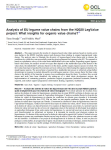
Article

Article
Cet article propose d’analyser les circuits courts au prisme de l’innovation sociale. Il s’appuie sur une étude de cas (un marché de producteurs biologiques) réalisée dans le cadre du programme Strenght2Food. Sa méthodologie mêle approche qualit[...]
Article
Le champ de recherche des systèmes alimentaires alternatifs foisonne : de nouvelles formes innovantes et hybrides de systèmes alimentaires apparaissent, comme les Systèmes alimentaires du milieu (SYAM). La question des processus qui sous-tendent[...]
Article
L’objectif de cet article est d’éclairer la logique des sociétés coopératives d’intérêt collectif (Scic) peu étudiées à ce jour. Parce qu’elles reposent sur le multisociétariat, les Scic peuvent être source de tensions entre les différentes caté[...]
Article
The study compares the productivity change over time of organic and conventional dairy farms in Denmark between 2011 and 2018 using data envelopment analysis, and aims to identify which technology is superior. Productivity changes and the differ[...]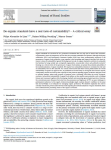
Article
Organic standards are conceived of as a governance mechanism that not only aims to ensure that consumers’ requirements in terms of transparency are met but also promotes sustainable food systems. Although third-party certification (TPC) and Part[...]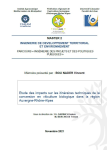
Thèse, Mémoire, Master
L’importance des enjeux environnementaux dans les activités viticoles est devenue un sujet de préoccupation sociale. Pour cela, plusieurs alternatives sont de plus en plus utilisées dans les systèmes de production pour aider les agriculteurs à d[...]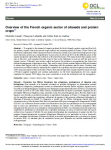
Article
To respond to the demand of organic products for feed (oilmeals, protein crops) and food (oil, dry pulses), organic oilseed and protein crops surfaces are increasing rapidly in France. Terres Univia, the interbranch organisation which represents[...]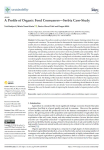
Article
In this paper, the authors analyze products from the organic farming system from consumption and consumers. The research aimed to determine the characteristics of the Serbian organic market, discover attitudes, practices, and features of differe[...]









